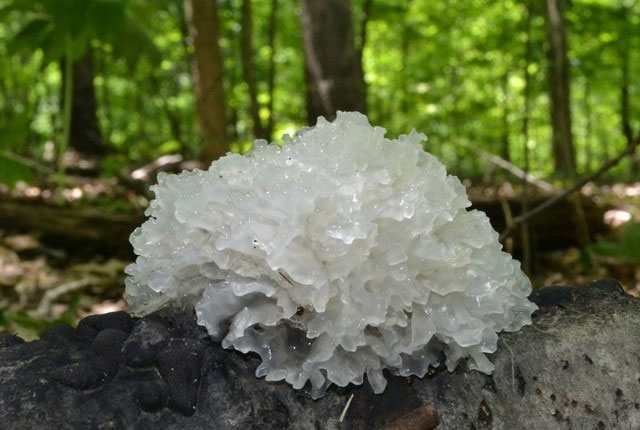This crunchy mushroom is known as the 'poor man's bird's nest', helping to control blood sugar while also beautifying the skin
This type of mushroom has been shown to have the ability to prevent heart disease, diabetes, increase collagen to beautify the skin as well as enhance brain health and the immune system.
Snow mushrooms are called by many names such as silver ear mushrooms, cat's ear mushrooms, snow mushrooms , etc. Snow mushrooms have existed for hundreds of years and originate from tropical climates such as Brazil, Australia, New Zealand, and the Philippines. Pacific islands and some places in Asia.
For centuries, this mushroom has been used in traditional Chinese medicine thanks to its uses such as anti-aging skin care, immune support, disease prevention. Snow mushrooms have gradually become a Familiar food, has a crunchy, chewy taste, easy to prepare into dishes such as soup, beauty tea, salad.
This mushroom is also known as the "poor man's bird's nest" because it has a collagen content not inferior to bird's nest but is cheaper and brings many health benefits. Containing lots of minerals, fiber, antioxidants and vitamins, this mushroom has many benefits in controlling blood sugar, improving heart health, supporting the immune system. Below are the benefits of snow fungus has been studied.

Snow mushrooms have the same collagen content as bird's nest but are cheaper.
Control blood sugar levels
In snow mushrooms, there are compounds called polysaccharides that are very notable. Research from Korea has shown that this same compound significantly reduced blood sugar levels and improved insulin sensitivity in people with type 2 diabetes.
Besides, studies in 2015 and 2016 respectively also showed that snow fungus can inhibit aldose reductase activity. This is an enzyme that when elevated can cause damage to the eyes and nerves in people with diabetes.
Reduces the risk of heart disease
Atherosclerosis is the buildup of plaque in the arteries and is considered a risk factor for high blood pressure and stroke. The main cause of atherosclerosis is the oxidation of LDL (bad) cholesterol.
A 2014 study in Korea demonstrated that antioxidants found in snow mushrooms can prevent the oxidation of LDL cholesterol mentioned above. This helps protect the body against cardiovascular diseases.
Improve skin
Snow mushrooms are very popular in the beauty industry thanks to their anti-aging and moisturizing properties. The polysaccharides in snow mushrooms also have the effect of reducing the loss of water and collagen from the skin, especially after the skin is exposed to sunlight or ultraviolet rays. Furthermore, snow mushrooms can also act as a natural moisturizer and anti-wrinkle agent for the skin.
Enhance brain health
According to research from China, polysaccharides in snow mushrooms may be able to protect brain cells against nerve damage and degenerative diseases. At the same time, snow mushrooms have also been shown to reduce the risk of developing Alzheimer's.
An eight-week Korean study had 75 participants consume snow mushrooms every day. The results showed that their scores when answering memory questions increased significantly. Similarly, another study in Korea in 2007 showed that snow mushroom extract could significantly reverse drug-induced memory loss.

Snow mushrooms are relatively safe to consume.
Enhance immune health
According to Healthline, bioactive compounds in snow mushrooms may stimulate certain cells that protect your immune system. Research from China in 2014 concluded that a protein found in white mushrooms can stimulate the activity of macrophages - a type of cell capable of killing bacteria and removing damaged tissue.
Note when using snow mushrooms
Snow mushrooms are relatively safe to consume. However, pregnant women, people with diarrhea, low phlegm, and coughs and colds should not use snow mushrooms to avoid side effects.
In addition, you should not eat them raw or look for snow mushrooms in the wild to avoid accidentally eating poisonous mushrooms. Snow mushrooms need to be soaked, washed and cooked before use
- 5 foods that help control blood sugar
- Introducing a new way to measure blood sugar
- Ways to overcome the effect of natural blood sugar reduction
- Use microwave to replace traditional blood glucose meter
- Great use of honey for health and beauty
- Temporary tattoos that measure blood sugar do not need to take blood
- Google's invention helps measure blood sugar without needles
- The reason for using sesame oil
- Successfully developing blood from human skin, opening a new era for medicine
- Biological sensors on frames help control blood sugar
- Scary things nobody knows about blood
- The device controls blood glucose
 13 causes of non-itchy rash
13 causes of non-itchy rash How the mouse with human ears changed the world?
How the mouse with human ears changed the world? The truth about 'fried rice syndrome!
The truth about 'fried rice syndrome! What is dental implant?
What is dental implant?